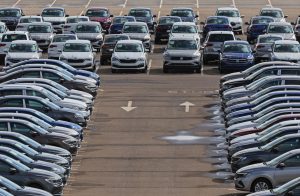The Russian media reported that Volkswagen AG could sell its Russian business – including an assembly plant and an internal combustion engine producer – to Austrian business conglomerate Steyr Automotive owned by ex-Magna CEO Siegfried Wolf.
According to those familiar with the matter, the company hopes to resume the production of VW cars in Russia under a different brand, as the company’s entire manufacturing activities were suspended in March in response to Russia’s unprovoked invasion of Ukraine.
If VW were to put this initiative into motion, the company would continue to supply components and spare parts to Russia, as well as provide engineering services, all of which would be a boon for the Russian auto market. VW’s production sites would then be managed by Russia’s automaker, GAZ Group, which is owned by Wolf’s long-time business partner, Oleg Deripaska, one of Russia’s most well-known Kremlin-linked oligarchs and who is currently under EU, US and UK sanctions for his close ties to Vladimir Putin.
Reports have indicated that Wolf, himself, chaired GAZ Group’s board from 2010-2019 and may have held a minority stake in the company.
Volkswagen has been manufacturing automobiles in Russia since 2007 at its assembly plant in Kaluga, 170 km southwest of Moscow, where the model range includes the Volkswagen Tiguan, the VW Polo and the Škoda Rapid. The company’s total investments in Russia, just prior to the beginning of the war in Ukraine, exceeded €2 billion.
In 2011, Volkswagen and GAZ Group signed an agreement for the contract assembly of Volkswagen and Škoda cars at the GAZ plant in Nizhny Novgorod, a city of more than 1.2 million people on the Volga River. In 2015, the company started production of its most modern engines at the Kaluga facility. VW sold around 199,000 vehicles in Russia over the course of 2021, over 80% of which were made at the company’s production sites in the country. Among them were the VW Polo and VW Tiguan, as well as the Škoda Rapid, Škoda Kodiaq and Škoda Octavia. The company estimated that its share in the Russian auto market stood at over 11% at the end of last year.
Those upward trending fortunes changed suddenly in March after Putin ordered his military to invade Ukraine. Volkswagen Group’s board decided to halt the production of vehicles in and end its exports to Russia. Over 4,000 of VW’s employees at the plant in Kaluga remain employed and continue to be paid a portion of their wages in compliance with Russian statutory requirements, though production has been fully suspended.
Since Russia launched its unprovoked war against Ukraine, all European, Japanese and Korean automakers have halted production in Russia citing EU and US sanctions, logistical challenges and a lack of severely limited parts from suppliers. As a result, car sales in Russia plunged more than 80% in May, hitting the lowest level since 2006.
Rumors have swirled for months that Putin, in light of growing economic pressure and battlefield failures in Ukraine, has considered nationalizing the manufacturing plants and other assets of global automakers companies. Other than Volkswagen, Stellantis, Ford and Mercedes-Benz would be those most affected by moves that Russian government officials like to dub “external administration”.
“If foreign owners unreasonably close their companies, then in such cases the government will propose the introduction of ‘external administration’,” Russian Prime Minister Mikhail Mishustin has told the media. “Depending on the decision of the owner, this will determine the fate of the enterprise.”
In May, France’s Renault sold its Russian assets to the Kremlin for a symbolic one ruble sum, with a call-back option for a 68% stake in Russia’s largest local automaker, Avtovaz.
Volkswagen was earlier believed to be in talks with Kazakh-based automaker Asia Auto regarding the sale of its assets, but thus far no concrete developments have emerged.

New cars parked at the Volkswagen Group plant in Kaluga, Russia.
While the size and details of the possible Volkswagen – Steyr deal are still unknown, it could be highly lucrative for Volkswagen, particularly in the current geopolitical environment. On the one hand, it allows the company to partly cover its multi-billion euro investments in Russia, while on the other – VW will formally quit Russia – a moral pledge for a major European company as a response to the Russian Federation’s brutal invasion of Ukraine. VW will, however, continue to benefit from the Russian market by supplying its components and spare parts and providing engineering services.
There is also the obvious ethical question that involves Deripaska, once the richest person in Russia. He is a well-known, sanctioned member of Putin’s inner circle. If Volkswagen were to have its way, Deripaska will clearly benefit from the deal, as VW’s former production sites will be managed by his own GAZ Group.
Simply put, making a sanctioned Russian oligarch even richer is utterly contrary to what the sanctions were designed for.
-------------------------------------------
By: Nicholas Waller
Title: Ex-Magna CEO could take control of Volkswagen’s assets in Russia
Sourced From: www.neweurope.eu/article/ex-magna-ceo-could-take-control-of-volkswagens-assets-in-russia/
Published Date: Mon, 12 Sep 2022 07:01:35 +0000
Read More
Did you miss our previous article...
https://badpoliticians.com/uk-politics/why-the-upcoming-samarkand-sco-summit-is-important-and-what-to-expect-from-the-outcome
 UK PoliticsWorld PoliticsVideosPrivacy PolicyTerms And Conditions
UK PoliticsWorld PoliticsVideosPrivacy PolicyTerms And Conditions
